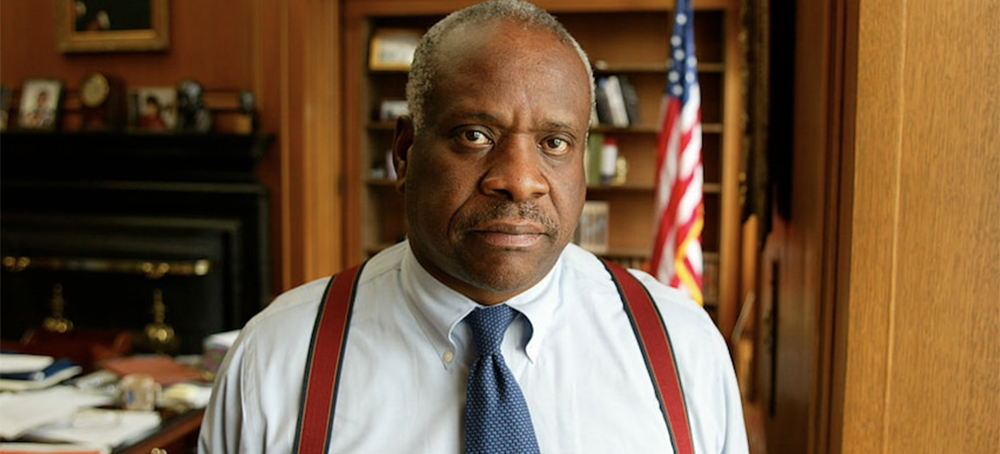Live on the homepage now!
Reader Supported News
But Justice Clarence Thomas took only months to reach a conclusion: the landmark 1973 ruling guaranteeing a woman's right to abortion should be discarded.
"The power of a woman to abort her unborn child" is not a liberty protected by the Constitution, said a dissenting opinion from four members of the court, including Thomas.
Thus began three decades of official Thomas opposition to the notion of a constitutionally protected right to abortion.
It will reach its zenith Wednesday, when Thomas and the most conservative Supreme Court in decades will consider a restrictive Mississippi abortion law that opponents and advocates alike agree is almost impossible to square with Roe and the precedents that have flowed from it.
The review coincides as well with something of a high-water mark for the 73-year-old Thomas, now the court's longest-serving member. He sits on a court with more justices who think like him than at any other point in his career.
These days, his colleagues offer unprecedented deference. After years of not asking questions at oral arguments, Thomas this term has asked the first question in every hearing. That is because no one jumps in until he has finished his low-key inquiries.
His seniority on the court means that he decides who writes the court's opinion when he is in the majority and Chief Justice John Roberts Jr. is on the losing side. That is a bit more commonplace now as the court has grown more conservative. With five justices to his right, Roberts's vote is no longer always key.
Thomas's influence has grown outside the courtroom as well. His former clerks - there are more than 125 of his "kids," as Thomas calls them - held many high-ranking positions in the Trump administration, including for a time the role of the administration's top lawyer at the Supreme Court. Ten have lifetime appointments in the federal judiciary.
One of those former clerks, recently hired Mississippi Solicitor General Scott Stewart, will be arguing the case for the state's law, which prohibits almost all abortions after 15 weeks, months earlier than the court's current abortion precedents allow.
If the court reaches the question of whether Roe should be overturned, Stewart will not have to worry about at least one vote.
"Our abortion precedents are grievously wrong and should be overruled," Thomas wrote in a dissenting opinion in 2020. The case concerned restrictions on abortion clinics and the doctors who perform the procedure, whom Thomas repeatedly referred to as "abortionists."
"The Constitution does not constrain the States' ability to regulate or even prohibit abortion," he added.
It is one of many times Thomas has written on the subject, as Senate Minority Leader Mitch McConnell, R-Ky., noted last month when he gave the keynote speech for a celebration of Thomas's 30 years on the Supreme Court.
"Take his jurisprudence on unborn life," McConnell said at the conclusion of a day-long retrospective of his Supreme Court tenure sponsored by conservative groups.
"Every time without fail, Justice Thomas writes a separate, concise opinion to cut through the 50-year tangle of made-up tests and shifting standards and calmly reminds everybody that the whole house of cards lacks a constitutional foundation," McConnell said.
Thomas has written that Roe cannot be sustained because the Constitution is silent on the subject of abortion. He has complained that the court bends its own rules and procedures to protect Roe and 1992's Planned Parenthood v. Casey, which reaffirmed the right and was the decision Thomas objected to in his first term on the court.
In 2019, he related abortion to eugenics, praising an Indiana law that would have made it illegal for someone to perform an abortion because of the fetus's race, sex, disability or diagnosis of Down syndrome.
"Each of the immutable characteristics protected by this law can be known relatively early in a pregnancy, and the law prevents them from becoming the sole criterion for deciding whether the child will live or die," Thomas wrote.
"Put differently, this law and other laws like it promote a state's compelling interest in preventing abortion from becoming a tool of modern-day eugenics."
While the rest of the court wanted additional lower courts to weigh in on similar laws in other states, Thomas warned: "Although the Court declines to wade into these issues today, we cannot avoid them forever."
"In terms of abortion, Justice Thomas is the tip of the spear," said Thomas Goldstein, a lawyer who frequently argues before the court and was a founder of SCOTUSblog, which closely chronicles the court's every move. "He is a driving force for overruling Roe v. Wade. And that position will make a decision that doesn't go so far and instead cuts back on Roe seem pretty modest."
If other justices say the court's precedents must be respected and overturned in the rarest of occasions, Thomas is an exception the other way.
"In my view, if the Court encounters a decision that is demonstrably erroneous - i.e., one that is not a permissible interpretation of the text - the Court should correct the error, regardless of whether other factors support overruling the precedent," he wrote in 2019.
As a result, Thomas is the court's most prolific justice when it comes to writing solo opinions that call for reconsidering the court's precedents.
At the symposium on Thomas's jurisprudence, Notre Dame law professor Nicole Stelle Garnett said her fellow Thomas clerks became familiar with it.
"Justice Thomas has since the beginning had a practice of saying, 'In an appropriate case, I'd reconsider all of American law,' " Garnett said, to laughter.
Sometimes, the justice's persistence pays off, now that the court's membership has changed. He has complained for years that the court has not taken up challenges of state and local gun control laws that have been upheld despite the court's 2008 ruling that the Second Amendment afforded an individual right to gun ownership in the home for self-defense.
The newly constituted court - with three members chosen by President Donald Trump - agreed and heard arguments last month about the right to carry a weapon outside the home.
His call to reexamine the court's landmark press protection ruling New York Times v. Sullivan is still a minority position, but he has been joined by Justice Neil Gorsuch. Other once lonely positions may attract new support.
In an evaluation of Thomas for NPR at the 20-year mark, Goldstein said Thomas's solo opinions were like "planting flowers in a garden that he thinks are going to bloom a long time from now. And whether that's going to happen is going to depend on the court's membership."
Ten years later, "I think that Justice Thomas's biggest and boldest constitutional theories are still a long way from being adopted," Goldstein said. "You can see similar themes in newer decisions - such as rules lowering the bar separating church and state. But the biggest effect of his bold thinking so far has to make other very conservative views seem essentially mainstream."
Thomas's idiosyncratic views and his resistance to compromise still make him the justice most likely to write a solo opinion. In the term completed last summer, he was in the majority 81 percent of the time - the lowest of all six conservatives and just ahead of the liberal justices.
Thomas has a growing conservative fan base outside of the court - and still also faces stout liberal opposition. His wife Virginia Thomas's conservative activism and closeness with the Trump administration remains a sore point.
Earlier this year, she apologized to Thomas's clerks for a rift that developed among them after her election advocacy of Trump and endorsement of the Jan. 6 rally in the District of Columbia that resulted in violence and death at the U.S. Capitol.
And Thomas's controversial confirmation, almost derailed because of sexual harassment charges by Anita Hill, is hardly forgotten.
"I still believe Anita Hill," protesters yelled this fall before Thomas gave a speech at the University of Notre Dame.
But these days, Thomas is able to shrug it off.
At the event marking three decades on the court, Thomas said he was celebrating "not because of me but because of you all and what we're trying to defend in this great country."
"I appreciate the senators who voted for me, all 52 of them," Thomas said, as the crowd began to laugh. "Hey, all you need is 50."
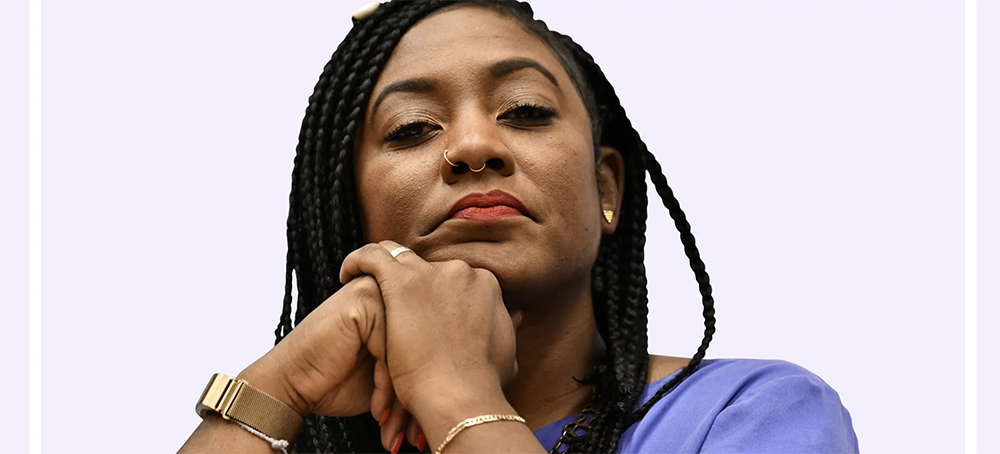 BLM Co-Founder Alicia Garza. (image: Teen Vogue/Getty Images)
BLM Co-Founder Alicia Garza. (image: Teen Vogue/Getty Images)
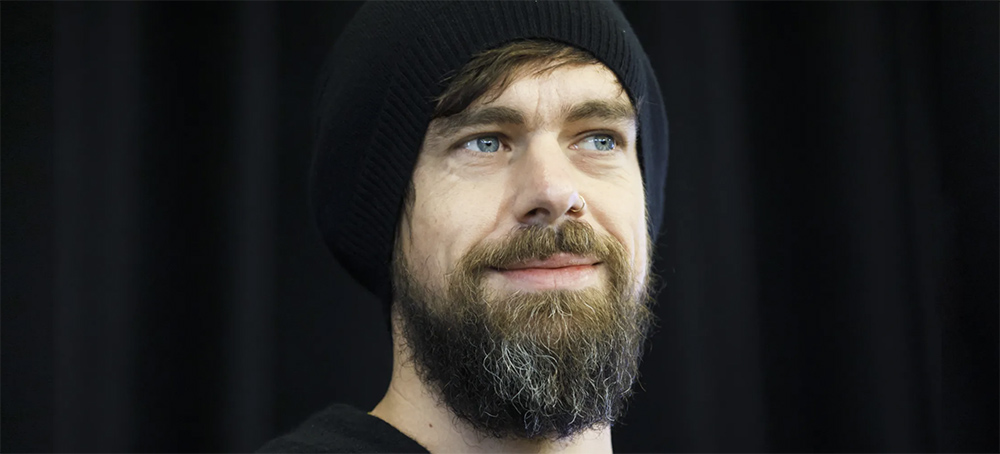 Jack Dorsey. (photo: Cole Burston/Bloomberg/Getty Images)
Jack Dorsey. (photo: Cole Burston/Bloomberg/Getty Images)
Soon after the news leaked to CNBC, the CEO tweeted that his time has come to an end. And Twitter's stock price is surging.
This morning, the Twitter founder and CEO tweeted a company-wide email obliquely explaining that the company has become too “founder-ied,” which he believes is “severely limiting” Twitter. Why? Who knows. This is the Tom Bombadil of CEOs.
He says he’s handing the reigns to Twitter CTO Parag Agrawal, who starts as CEO today.
Dorsey plans to resign from the board in May in order to “give Parag the space he needs to lead” and because “it’s critical a company can stand on its own, free of its founder’s influence or direction.” By that logic, he would need to step down from Square (a company he founded) as well.
The news leaked this morning to CNBC, with no additional information. You’ve got to hand it to the man. Whatever goes on at Twitter, Jack’s kept his plans tight.
In 2019, Dorsey announced plans to spend six months traveling through Africa and presumably evangelizing cryptocurrency. (“Africa will define the future (especially the bitcoin one!)” he tweeted.) Dorsey also serves as CEO of Square. In early 2020, billionaire Twitter board member Paul Singer called for his resignation due to his split focus between those ventures.
Twitter shares briefly bumped 11 percent following the news, and trading was quickly halted due to volatility.
Jack first served as Twitter CEO in 2007 and was reportedly forced out a year later because, among other reasons, he spent too much time focusing on fashion design. He returned to Twitter in 2011 as Twitter executive chair, got rich from the IPO, and returned to the CEO role in 2015.
Dorsey’s kept things slow and steady, which historically infuriated everyone nearly as much as Zuckerburg’s more overt wreckage. By the time his inscrutable speak-softly approach permitted near-nuclear annihilation, he graded his performance a “C.” He rarely offered sentences that made sense.
But when Twitter finally budged, it budged. Twitter baned political ads and added increasingly conspicuous fact-check labels and (granted, after an armed insurrection) banned Donald Trump.
In the end, Twitter caused a massive headache and got his ass dragged to a Congressional hearing. Bitcoin conferences seem preferable.
This is a developing story. Check back for updates.
 A medical worker wears plastic gloves at a temporary screening clinic for the coronavirus in Seoul, South Korea, Monday, Nov. 29, 2021. (photo: Lee Jin-man/AP)
A medical worker wears plastic gloves at a temporary screening clinic for the coronavirus in Seoul, South Korea, Monday, Nov. 29, 2021. (photo: Lee Jin-man/AP)
The hoarding of limited COVID-19 shots by rich countries — creating virtual vaccine deserts in many poorer ones — doesn’t just mean risk for the parts of the world seeing shortages; it threatens the entire globe.
That's because the more the disease spreads among unvaccinated populations, the more possibilities it has to mutate and potentially become more dangerous, prolonging the pandemic for everyone.
“The virus is a ruthless opportunist, and the inequity that has characterized the global response has now come home to roost,” said Dr. Richard Hatchett, CEO of CEPI, one of the groups behind the U.N.-backed COVAX shot-sharing initiative.
Perhaps nowhere is the inequality more evident than in Africa, where under 7% of the population is vaccinated. South African scientists alerted the World Health Organization to the new omicron variant last week, though it may never be clear where it first originated. Researchers are now rushing to determine whether it is more infectious or able to evade current vaccines.
COVAX was supposed to avoid such inequality — but instead the initiative is woefully short of shots and has already abandoned its initial goal of 2 billion doses.
Even to reach its scaled-back target of distributing 1.4 billion doses by the end of 2021, it must ship more than 25 million doses every day. Instead, it has averaged just over 4 million a day since the beginning of October, with some days dipping below 1 million, according to an Associated Press analysis of the shipments.
Shipments in recent days have ramped up, but nowhere near the amount needed.
Meanwhile, richer nations often have a glut of shots, and many are now offering boosters — something the WHO has discouraged because every booster is essentially a dose that is not going to someone who's never even gotten their first shot. Despite the U.N. health agency's appeal to countries to declare a moratorium on booster shots until the end of the year, more than 60 countries are now administering them.
“What it highlights are the continuing and fundamental risks to everyone associated with not seriously addressing the inequalities still at play globally in the fight against disease and poor health," said Dr. Osman Dar, director of the One Health Project at the Chatham House think tank.
Anna Marriott, health policy manager for Oxfam, said COVAX was limited from the outset after being pushed to the back of the vaccine queue by rich countries.
“The COVAX team may be delivering as fast as they can, but they can’t deliver vaccines they haven’t got,” Marriott said.
Just 13% of vaccines COVAX contracted for and 12% of promised donations have actually been delivered, according to calculations by the International Monetary Fund from mid-November. About a third of the vaccines dispensed by COVAX have been donations, according to the vaccine alliance known as Gavi, and the initiative is now partly a clearinghouse for those donated doses, the very situation it was set up to avoid.
Last week, COVAX sent out a news release praising a European Union pledge to ship 100 million vaccines to Africa by the end of the year — but only 1/20 of that amount was actually on planes.
Asked about the logistical challenges of distributing the other 94 million doses in only six weeks, Aurelia Nguyen, managing director of COVAX maintained that arrangements “are in place to move a vast number of doses between now and the end of the year."
In a statement, she said the issue was ensuring that “conditions are right on the ground for doses to be administered.”
In minutes released ahead of an executive meeting this week, Gavi fretted that the perception that rich countries are dumping older or lesser vaccines on poor countries could undermine the whole project. On Monday, in a joint statement with WHO and the African Union among others, it admonished that “the majority of the donations to date have been ad hoc, provided with little notice and short shelf lives.”
Fury over dose dumping is already very real. In Malawi and South Sudan, tens of thousands of out-of-date doses were destroyed.
But it's not just getting the vaccines into poorer countries that's a problem, according to some experts. COVAX is “falling short on getting vaccines from the (airport) tarmac into people’s arms,” said Dr. Angela Wakhweya, senior director for health equity and rights at CARE.
Authorities in Congo, for instance, returned their entire COVAX shipment this summer when they realized they would not be able to administer doses before they expired.
In a “risk management” report on COVAX, Gavi warned that “poor absorption” of vaccines by developing countries could lead to “wastage” of some doses. One problem is logistics — just getting the doses in the right country at the right time. But just as important is the ability of often underfunded national health systems to distribute the shots where they're most needed, along with syringes and other necessary gear. A third issue is persuading sometimes hesitant people to get the vaccines.
World Health Organization Director-General Tedros Adhanom Ghebreyesus, however, has disputed distribution is a problem, saying the only obstacle to immunization in poor countries is supply.
Most COVAX doses distributed so far have been AstraZeneca’s vaccine, a shot that has yet to be authorized in the U.S. and whose botched rollout in Europe helped fuel anti-vaccine sentiment when the vaccine was linked to rare blood clots. The vaccines mostly used in the U.S. and much of Europe — made by Pfizer-BioNTech and Moderna — have only been available in tiny amounts via COVAX.
The U.S., which blocked vaccine sales overseas and exports of key ingredients for months, has donated 275 million doses in all, more than any other country but still less than a third of what the Biden administration pledged. The European Union, which has in general allowed vaccines manufactured in the bloc to be sold anywhere in the world, has actually delivered about a third of its 400 million promised doses.
Efforts to ramp up global production beyond a select group of manufacturers have stalled, which many activists and scientists blame on pharmaceutical companies' opposition to waive intellectual property rights for the highly lucrative vaccines.
Given that the pandemic has so far not devastated Africa as many had initially feared, some scientists on the continent are now discussing whether to withdraw their vaccine requests.
“I think what Africa could do to really shame the world is to stop asking for vaccines,” said Christian Happi, a Nigerian virologist who sat on the scientific advisory board of CEPI. “The vaccines have not arrived, and anyways it may turn out that we don’t need them as much as the West.”
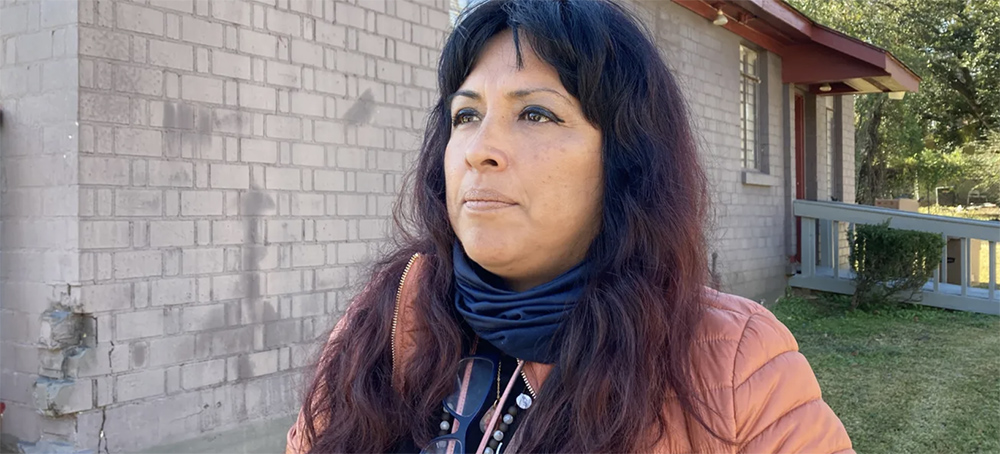 Lorena Quiroz, executive director of the Immigrant Alliance for Justice and Equity. (photo: Clarion Ledger)
Lorena Quiroz, executive director of the Immigrant Alliance for Justice and Equity. (photo: Clarion Ledger)
The group of about 40 people included day laborers, immigrant youth and immigration activists from across central Mississippi from Morton, Utica, Carthage, Canton, Ridgeland and Jackson, demanding attention from state and federal officials.
Led by leaders from the Immigrant Alliance for Justice and Equity, a nonprofit formed in 2019 to educate, empower and organize immigrant communities in Mississippi, the group demanded not only respect at the workplace and in the community, but also a meeting with U.S. Secretary of Homeland Security, Alejandro Mayorkas, and Thompson.
Lorena Quiroz, executive director of the Immigrant Alliance for Justice and Equity, said since the 2019 raids by U.S. Immigration and Customs Enforcement, immigrants have been terrified.
In August 2019, hundreds of immigration officials descended on seven Mississippi plants in the largest immigration sting of that kind in more than a decade. A total of 680 people were arrested, with more than 300 people detained in an ICE facility in Louisiana.
"People still continue to endure abuses in poultry plants and other places of employment were they're treated as less than because they're undocumented," Quiroz said. "So what we want is for deferred action, and it's something that can be done or can be influenced by Congressman Thompson."
Deferred action would be a protection for workers who file grievances against employers, Quiroz said.
The organization, Quiroz said, is working with a national campaign and other states to have Mayorkas grant people who were affected by the raids, suffered grievances and were sexually harassed to get deferred action until the cases are resolved.
After a brief warm-up in front of the Congressman's office, the group began their trek down Medgar Evers Boulevard to Woodrow Wilson Avenue heading towards the office of the Immigrant Alliance for Justice and Equity, 510 George St.
The 3-mile long march included stops for people to step forward and share their stories of workplace abuse, discrimination, wage theft and the impact of the raids.
Standing in front of Thompson's Jackson office, Anai detailed her own experiences of abuse and harassment from supervisors at her work for being an undocumented worker, Quiroz translated for Anai.
Anai described how she has had supervisors who would tell immigrant workers the hospital wasn't an option for them if they got hurt while working.
Instead, if Anai cut her finger, the supervisors would give her a Band-Aid and say that is all she could get because she is undocumented, she said.
"Many of us, because we're not able to find other jobs or because we fear deportation, stay there," Anai said. "And we remain here, just enduring what has been done to us. There's no respect. There's no equality like the folks that are from here, because we're undocumented. We want respect. We want working papers. We want equity."
Manuela Castro, who came from Guatemala and has lived in Canton for 16 years, said she's witnessed the discrimination and abuse some workers face from authorities for not having documents.
One instance Castro shared with the crowd was about a friend who has yet to be paid for a week's worth of work she did some time ago, Castro explained.
The friend has called her boss several times asking for her check, but instead, she has been threatened to have the police or immigration services called on her.
"It is time for President Biden to answer what he promised," Castro said. We need respect and papers so we won't be oppressed. We are human beings, not animals."
Castro said it is clear how resilient the community has been to continue working through the COVID-19 pandemic to provide residents in the state with food from the poultry plants.
"We are the ones that bring that food to your table," she said.
Castro hopes the march and her words can be heard by Biden, Mayorkas and Thompson. She added she hopes Thompson will take responsibility for not responding to the group's efforts of meeting with him, even canceling one meeting 30 minutes before its scheduled time.
"What we need is respect and permits."
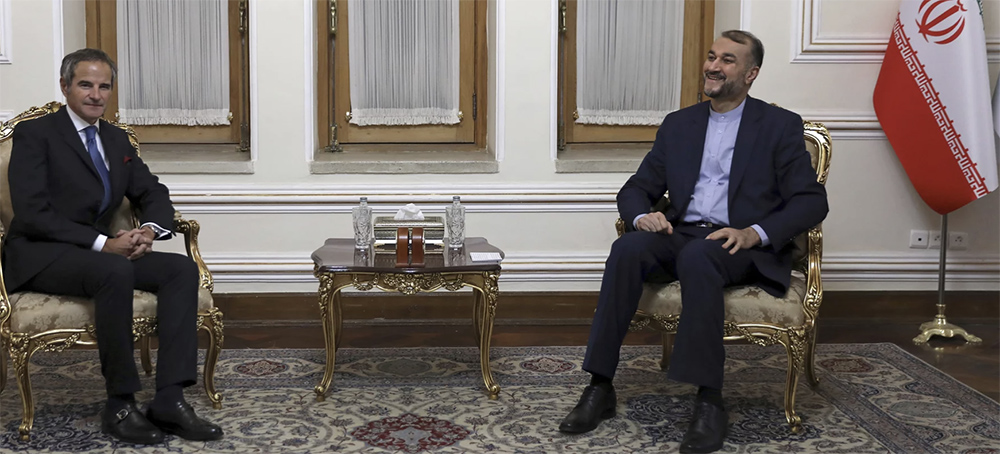 Head of the International Atomic Energy Agency Rafael Mariano Grossi, left, and Iranian Foreign Minister Hossein Amirabdollahian pictured meeting in Tehran, on Tuesday. Grossi pressed for greater access in the Islamic Republic ahead of diplomatic talks restarting over Tehran's tattered nuclear deal with world powers. (photo: Vahid Salemi/AP)
Head of the International Atomic Energy Agency Rafael Mariano Grossi, left, and Iranian Foreign Minister Hossein Amirabdollahian pictured meeting in Tehran, on Tuesday. Grossi pressed for greater access in the Islamic Republic ahead of diplomatic talks restarting over Tehran's tattered nuclear deal with world powers. (photo: Vahid Salemi/AP)
And a lot has happened since the last round to raise the stakes for any deal.
To recap, the 2015 deal gave Iran relief from economic sanctions in return for limits on its nuclear program. President Trump abandoned the agreement in 2018, reimposing the sanctions the U.S. had lifted. Iran responded with a public, step-by-step ramping up of the machinery used to enrich uranium — the nuclear fuel needed for a bomb.
Iran and the U.S. — along with the other world powers involved in the deal — say they want to restore it. But they've been stuck on who takes the first steps.
Since the talks stalled, Iran has elected a new, hard-line president who's heightened his country's demands for any new agreement. And in the background, there's been a series of attacks on Iran's nuclear program, suspected to originate in Israel, including the assassination of a leading Iranian scientist a year ago. That raises the risk of conflict at the bargaining table.
Both the U.S. and Iran are out of compliance with the deal right now
The Trump administration argued that the agreement worked out by the Obama White House was too short — parts of it expire in 2025 — and should have required fundamental changes in Iran's policies. When Trump reimposed sanctions, he cut off most of Iran's oil sales. When other partners in the deal — the European Union, China, Russia — objected, the U.S. threatened that any company doing business with Iran would also be cut off from business with the U.S. Most of those sanctions are still in place and Iranians feel the economic pain. That's leverage for Biden's negotiators now.
In response to the U.S. exit, Iran methodically broke the deal's limits — its conservative parliament even passed a law to require those breaches. The country has since stockpiled more enriched uranium than the deal allows. And it has enriched its supply well beyond the levels stipulated in the deal, that is, closer to the levels of enrichment needed for a weapon.
Back when the U.S. was in the deal and Iran was complying with it, analysts said its program was frozen and at least a year away from making enough enriched uranium needed for a bomb. Now, experts say it could be a month away if Iran wanted to go for it. (But making an actual bomb, testing it and loading it on missiles could take a year or two.) Perhaps most troubling, Iran has restricted access to inspectors from the International Atomic Energy Agency, an atomic watchdog that monitors its nuclear sites. They could be missing out on vital information.
To get back in the deal, the U.S. would need to unspool the complicated web of sanctions. Iran would have to open up again to inspectors, dismantle equipment, and ship out uranium or reduce its levels of enrichment. Either way, Iran has already learned more about how to make a nuclear weapon in the process.
Iran has new leadership sounding a harder bargaining position
Amid resentment over the country's poor economy and disappointment in the collapse of the deal, Iranians elected President Ibrahim Raisi in June. He's more of a hard-liner than his predecessor, Hassan Rouhani, who had agreed to the deal in 2015. Raisi seems determined to show he can get a better deal for his people.
The man expected to lead the negotiations for Iran recently said these shouldn't even be called, "nuclear talks." He claims they're about sanctions. "We do not have nuclear talks," Iranian Deputy Foreign Minister Ali Bagheri Kani told state media, "because the nuclear issue was fully agreed in 2015."
Iranian officials say, basically, that since it was the U.S. that first broke the deal, it should be the U.S. that makes the first moves to get it going again by lifting all the sanctions. And, burned by Trump's withdrawal, they say they want a guarantee the deal will remain in force even after the next U.S. presidential election — a promise probably not possible under the U.S. system.
The Biden administration wants a deal, but it won't wait much longer
U.S. officials see the new posturing on the other side and say it's up to Iran to prove it's interested in a deal. Speaking to NPR last week, U.S. negotiator Robert Malley tempered expectations. "If [Iran is] dragging their feet at the negotiating table, accelerating their pace with their nuclear program, that will be their answer to whether they want to go back into the deal," Malley said. "And it will be a negative one if that's what they choose to do."
He's urged Iran to at least meet directly with the U.S., which it refuses. He and European leaders have called on Iran to stop breaking the terms of the deal. Malley told NPR that if Iran doesn't return to the deal, the U.S. would need "other efforts, diplomatic and otherwise, to try to address Iran's nuclear ambitions." He said Iran's nuclear advances could soon make it too late for a deal. "We don't have much time before we have to conclude that Iran has chosen a different path," he said.
At times, the U.S. has also raised the idea adding new conditions to the deal — including possibly extending the term of the agreement or trying to include limits on Iran's ballistic missile program. Iran says those are non-starters.
Supporters of a deal say it would curb Iran's nukes. Opponents say it would let Iran skate on missiles and militants
Proponents of re-entering the deal say it keeps Iran from getting close to making a bomb. Even Trump's defense secretary said Iran was in compliance back when the deal was in effect. Backers of an agreement say other issues with Iran — like its support for militants, human rights violations, threats against Israel and Saudi Arabia — can be managed separately and more easily if the country doesn't pose a nuclear threat.
Opponents to the deal say the Iranian regime is shaky and hurting from the sanctions. They maintain Iran would make more concessions to get out of sanctions or could even eventually be brought down. Sanctions relief would give the Iranian government access to vast oil revenues it could use to destabilize the Mideast. Some Israeli officials suggest sabotage or even military strikes are preferable to keep Iran's nuclear program from advancing.
But that's seen as a risky approach that could lead to war. The Biden administration is looking to take Iran off the list of possible world flashpoints. And Iran wants to start doing business with the world. That might be enough to lead both countries to a new agreement, whether it's a return to the old deal or some half-step toward easing tensions. The latter could mean a partial deal — lifting some U.S. sanctions in exchange for Iran scaling back some of the steps it's taken.
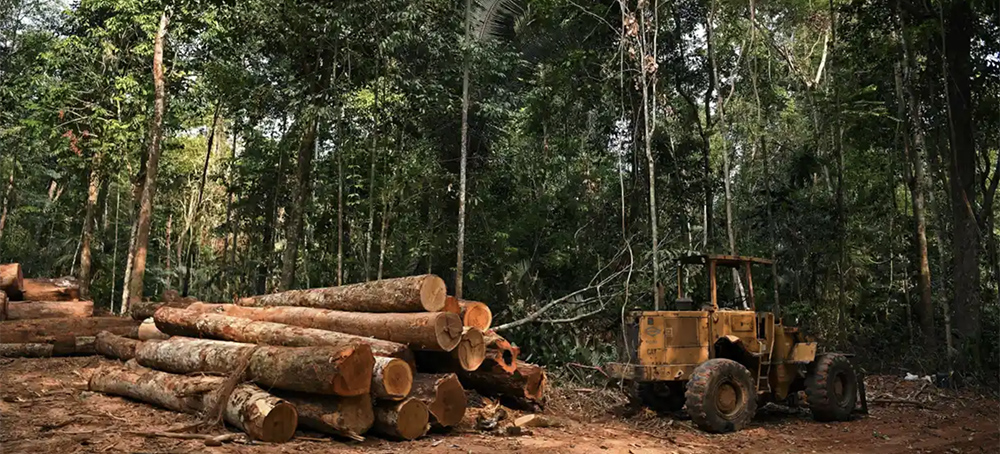 Research has shown that the cattle industry is the single largest driver of deforestation of the Amazon and the fashion industry is a key cog in the leather exportation machine. (photo: Carl de Souza/AFP/Getty Images)
Research has shown that the cattle industry is the single largest driver of deforestation of the Amazon and the fashion industry is a key cog in the leather exportation machine. (photo: Carl de Souza/AFP/Getty Images)
LVMH, Zara, Nike and others at risk of contribution to destruction of rainforest based on connections to leather industry
The report, released Monday, analyzed nearly 500,000 rows of customs data and found that brands such as Coach, LVMH, Prada, H…M, Zara, Adidas, Nike, New Balance, Teva, UGG and Fendi have multiple connections to an industry that props up Amazon deforestation.
More than 50 brands have multiple supply-chain links to the largest Brazilian leather exporter, JBS, which is known to engage in Amazon deforestation. JBS recently made a commitment to achieve zero deforestation across its global supply chain by 2035, something environmental groups have called insufficient.
The study was conducted by Stand.earth, a supply chain research firm. The findings are surprising, in part because a number of the brands surveyed have recently announced policies to untangle themselves from actors along the supply chain that contribute to deforestation.
“With a third of companies surveyed having some kind of policy in place, [you’d expect] that would have an impact on deforestation,” said Greg Higgs, one of the researchers involved in the report. “The rate of deforestation is increasing, so the policies have no material effect.”
The researchers hope to one day expand to other industries that rely heavily on leather, like the automotive sector.
In 2019 and 2020, Brazil faced criticism from world leaders for not doing more to protect the forest from raging wildfires. Deforestation in the critical ecosystem continues at an alarming rate. Research has shown that the cattle industry is the single largest driver of deforestation of the Amazon rainforest and the fashion industry is animportant cog in the leather exportation machine.
In fact, projections show that in order to keep supplying consumers with wallets, handbags and shoes, the fashion industry must slaughter 430m cows annually by 2025.
Their analysis does not prove a direct link between each fashion brand and Amazon deforestation; instead, researchers found connections that increase the probability of any individual garment coming from cattle ranching in the Amazon, an industry described as the No 1 culprit of deforestation in the area.
The report identified fashion brands that participate in the Leather Working Group or other voluntary commitments, but highlight that the Leather Working Group evaluates tanneries only on their ability to trace leather back to slaughterhouses, not back to farms.
“The goal is to develop a clear plan [for the fashion industry] to close the loopholes,” said Jungwon Kim, vice-president of strategy of Slow Factory, the climate justice non-profit that collaborated on the report.
Of the 84 companies analyzed by the report, 23 had explicit policies on deforestation. The researchers believe those 23 companies are “likely” violating their own policies, based on their findings. The fashion house LVMH, for example, was found to have a high risk of connections to Amazon deforestation – despite the fact that earlier this year the brand pledged to protect the vulnerable region with Unesco.
Sônia Guajajara, executive coordinator of the Brazilian Indigenous Peoples’ Alliance (APIB), said brands have “the moral responsibility, the influence and the economic resources” to stop working with suppliers contributing to deforestation in the Amazon today, “not in 10 years, not in 2025”.
The effect of recent wildfires in the Amazon has had devastating consequences for Indigenous groups, who say president Jair Bolsonaro forcibly removed Indigenous peoples to make way for agriculture, mining and other development activities.
Angeline Robertson, an investigative researcher who worked on the study, told the Guardian she hopes the fashion industry will take cues from their analysis and “work in their own self-interest”.
“In this time of climate emergency, if the fashion industry wants to be relevant, this is the opportunity,” she said.
Céline Semaan, chief executive and co-founder of Slow Factory, said brands should not use this as an opportunity to contribute to deforestation elsewhere, such as Guatemala or Mexico, but invest in and explore alternatives that are not extractive.
With lab-grown alternatives on the rise, a future where your favorite bag or sneakers don’t come at the expense of the Amazon rainforest is possible.
“At the end of the day, we have to find other solutions and other alternative leathers that are not animal-based and that are not plastic-based,” said Semaan. “With the resources that fashion companies have, there’s really no excuse.”
Follow us on facebook and twitter!
PO Box 2043 / Citrus Heights, CA 95611

